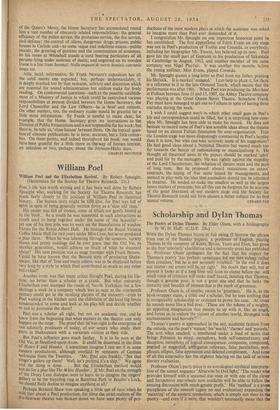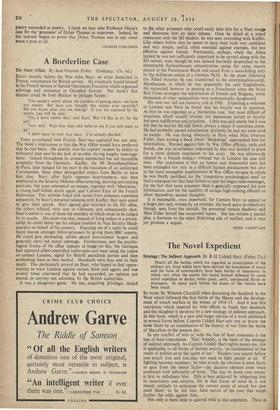Scholarship and Dylan Thomas
WITH the Dylan Thomas boom in full swing (I borrow the phrase from one of the Sunday papers), a professor of English, placing Thomas in the company of Keats, Byron, Yeats and Eliot, has given us the first 'scholarly' elucidation and a university press has published it. Professor Olson. apologises for the fact that his respect for Thomas's poetry 'has perhaps sometimes led me into eulogy rather than criticism,' but he is not seriously troubled: 'In the end it does not matter: my errors will be set right.' No doubt they will, but at present it looks as if a long time will have to elapse before the still small voice of criticism will make itself heard, insisting that Thomas, though a genuine poet, is not a great one and that he lacks the maturity and breadth of interest that is the mark of greatness.
Professor Olson is, of course, sworn to 'greatness.' He is, as the book-wrapper states, a critic and a scholar, but he uses nothing that is recognisably scholarship or criticism to prove his case. At times he sounds more like a bad poet: 'These are the tokens of a mighty, an appalling imagination that sweeps us up with it, like an angel, and forces us to endure the visions of another world, thronged with enchantments and horrors.'
Thomas's poetry is approached in the old, academic fashion from the outside, via the poet's 'nature,' his 'world," themes' and periods.' The text, when reached, is smothered under a load of terms that brings Polonius to mind: metaphors, both self-contradictory and deceptive, metaphors of logical consequence, composite, compound, implied or suggested, ambiguous reference, false parallelism, peri- phrasis, ellipsis, false apposition and delayed compliment. And none of all this externality has the slightest bearing on the task of serious literary evaluation. Professor Olson'is party-piece is an astrological-mythical interpreta- tion of the sonnet sequence 'Altarwise by Owl light; `The reader who
provides himself with a seasonal star-map or with one of the clever and inexpensive star-wheels now available will be able to follow the ensuing discussion with much greater profit.' His 'method' is a prose poetry succeeded as poetry. I think we may take Professor Olson's case for the 'greatness' of Dylan Thomas as unproven. Indeed, he has scarcely begun to prove that Dylan Thomas was in any exact sense a poet at all.
CHARLES TOMLINSON



































 Previous page
Previous page